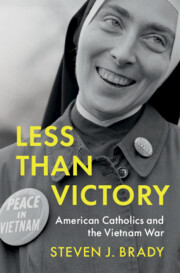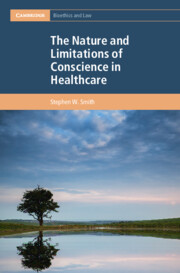Refine search
Actions for selected content:
119 results

Less Than Victory
- American Catholics and the Vietnam War
-
- Published online:
- 16 October 2025
- Print publication:
- 11 September 2025
5 - Conscientious Provision and Objection
-
- Book:
- The Nature and Limitations of Conscience in Healthcare
- Published online:
- 12 September 2025
- Print publication:
- 02 October 2025, pp 82-109
-
- Chapter
- Export citation
1 - Introduction
-
- Book:
- The Nature and Limitations of Conscience in Healthcare
- Published online:
- 12 September 2025
- Print publication:
- 02 October 2025, pp 1-14
-
- Chapter
- Export citation
8 - Conclusion
-
- Book:
- The Nature and Limitations of Conscience in Healthcare
- Published online:
- 12 September 2025
- Print publication:
- 02 October 2025, pp 173-185
-
- Chapter
- Export citation
3 - Respecting Conscience
-
- Book:
- The Nature and Limitations of Conscience in Healthcare
- Published online:
- 12 September 2025
- Print publication:
- 02 October 2025, pp 39-61
-
- Chapter
- Export citation
6 - Complicity and Corporate Conscience
-
- Book:
- The Nature and Limitations of Conscience in Healthcare
- Published online:
- 12 September 2025
- Print publication:
- 02 October 2025, pp 110-151
-
- Chapter
- Export citation
2 - Conscience from First Principles
-
- Book:
- The Nature and Limitations of Conscience in Healthcare
- Published online:
- 12 September 2025
- Print publication:
- 02 October 2025, pp 15-38
-
- Chapter
- Export citation
7 - Regulating Claims of Conscience
-
- Book:
- The Nature and Limitations of Conscience in Healthcare
- Published online:
- 12 September 2025
- Print publication:
- 02 October 2025, pp 152-172
-
- Chapter
- Export citation

The Nature and Limitations of Conscience in Healthcare
-
- Published online:
- 12 September 2025
- Print publication:
- 02 October 2025
7 - “Outweighed by the Destruction”: April 1970–December 1971
-
- Book:
- Less Than Victory
- Published online:
- 16 October 2025
- Print publication:
- 11 September 2025, pp 214-250
-
- Chapter
- Export citation
Chapter 9 - A Sense of Duty
- from Part IV - Virtues of Indirect Caring
-
- Book:
- Attention to Virtues
- Published online:
- 25 July 2025
- Print publication:
- 14 August 2025, pp 216-237
-
- Chapter
- Export citation
Peut-il y avoir agentivité morale sans sentience ?
-
- Journal:
- Dialogue: Canadian Philosophical Review / Revue canadienne de philosophie / Volume 64 / Issue 1 / April 2025
- Published online by Cambridge University Press:
- 07 July 2025, pp. 65-79
-
- Article
-
- You have access
- Open access
- HTML
- Export citation
Chapter 4 - Discourse as Communicative Expression
-
-
- Book:
- Heidegger's <i>Being and Time</i>
- Published online:
- 28 June 2025
- Print publication:
- 26 June 2025, pp 71-83
-
- Chapter
- Export citation
24 - Civil Disobedience
- from Part II - Modalities
-
-
- Book:
- The Cambridge Handbook of Constitutional Theory
- Published online:
- 27 March 2025
- Print publication:
- 24 April 2025, pp 397-416
-
- Chapter
- Export citation
Equity in Kantian Morality: Unmuting the ‘Divinity Who Cannot Be Heard’
-
- Journal:
- Kantian Review , First View
- Published online by Cambridge University Press:
- 21 April 2025, pp. 1-23
-
- Article
- Export citation
DAMNA USUUM: COMMON LAW, CONSCIENCE AND THE “SUFFERANCE OF USES”
-
- Journal:
- The Cambridge Law Journal , First View
- Published online by Cambridge University Press:
- 10 April 2025, pp. 1-24
-
- Article
-
- You have access
- Open access
- HTML
- Export citation
How Catholic Health Systems Made “Conscientious Objection” Unconscionable
-
- Journal:
- Journal of Law, Medicine & Ethics / Volume 53 / Issue 1 / Spring 2025
- Published online by Cambridge University Press:
- 17 June 2025, pp. 103-105
- Print publication:
- Spring 2025
-
- Article
-
- You have access
- Open access
- HTML
- Export citation
Kant on Remorse, Conversion, and the Descent into the Hell of Self-Cognition
-
- Journal:
- Kantian Review / Volume 29 / Issue 3 / September 2024
- Published online by Cambridge University Press:
- 04 October 2024, pp. 447-466
- Print publication:
- September 2024
-
- Article
- Export citation
Chapter 3 - Puritan Democracy
-
- Book:
- Democracy, Theatre and Performance
- Published online:
- 17 May 2024
- Print publication:
- 27 June 2024, pp 63-89
-
- Chapter
- Export citation
Should Catholics Support Laws Prohibiting Abortion?
-
- Journal:
- New Blackfriars / Volume 105 / Issue 3 / May 2024
- Published online by Cambridge University Press:
- 18 April 2024, pp. 244-264
- Print publication:
- May 2024
-
- Article
-
- You have access
- Open access
- HTML
- Export citation
